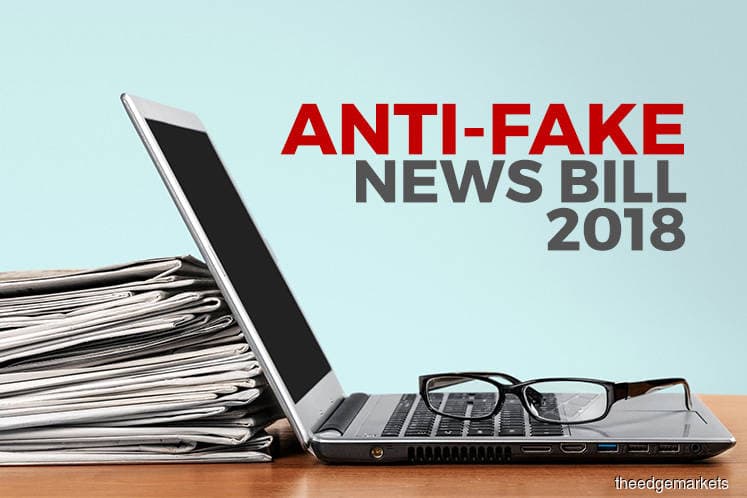
This article first appeared in The Edge Malaysia Weekly on April 2, 2018 - April 8, 2018
AS the last session of the present parliament term proceeds, heightened media attention, both domestic and foreign, has focused on two major legislative proposals. One is the approval of a constituency redelineation exercise for the general election, which has to take place in the next few months. The other, which is particularly close to the hearts of those in media circles, is the so-called Anti-Fake News Bill.
The notion of fake news has been much brandished about around the world in recent months, especially in the US. Iconoclastic President Donald Trump, in his frequent tweets, routinely labels news items unfavourable to him or his administration as fake news. Nevertheless, as the liberal tradition in the US values freedom of speech, almost above everything else, as being crucial to the functioning of a genuine and robust democracy, Trump can do little about so-called fake news, apart from seeking civil protection in defamation laws, just like any other American.
But of course, the fallout from Trump’s frequent trumpeting of fake news creates tremendous moral hazards for the rest of the world, especially in those regions where genuine democratic traditions have not taken root. The powers that be in these countries could use Trump’s fake news pronouncements to justify tighter control on freedom of speech, as the US is often viewed as the beacon of liberal democracy.
In the local context, it is said that there are at least two somewhat contradictory motivations as to why the government decided to introduce an Anti-Fake News Bill at this juncture. From the government’s point of view, “dissemination of fake news becomes a global concern”, seemingly paying heed to Trump’s fake news sentiments above. It further “seeks to safeguard the public against the proliferation of fake news”. Court-ordered removals of fake news could “deal with the misuse of publication mediums, in particular social media platforms”. And “it is hoped that the public would be more responsible and cautious in sharing news and information”.
From the point of view of the opposition and civil liberty activists, however, the bill is the latest in a series of increasingly stringent steps to restrict freedom of expression, not only locally but also internationally. As an example, they point to the series of unsettling dealings related to quasi-sovereign fund 1MDB, which have been widely reported internationally and which has led to investigations and law-enforcement action in many jurisdictions abroad, but which nevertheless have been summarily declared by the Malaysian authorities as essentially non-events. In such circumstances, will the official Malaysian stance of 1MDB’s “non-events” be determined to be the “truth”, while various foreign reports that characterise them as essentially “kleptocratic” dealings be deemed falsehoods?
As the Anti-Fake News Bill provides for extraterritorial applicability and enables prosecution of even foreign news sources, it would appear that they are not immune to criminal prosecution, not to mention local news outlets that carry such news reports, and people who may share such news via social media. The bill covers them all and provides stiff penalties of up to 10 years’ imprisonment and half-a-million ringgit fine.
This would undoubtedly create a chilling effect on impartial journalism both domestic and foreign, as well as curtail open and robust public discourse on public policies, notwithstanding the vow that “right to freedom of speech and expression under the Federal Constitution is respected”.
The domestic courts, which are apparently tasked with distinguishing “fake” versus “true” news, will be put in a dilemma when it comes to news items that are officially characterised as “false” locally, but which are reported by reputed and authoritative international news outlets. The bill makes no distinction between such serious news items and those maliciously spewed out by, for example, extremist elements.
As the Malaysian general election season will kick in within the next few months, political rhetoric and polemics can be expected from both sides of the political divide. With the impending passage of the Anti-Fake News Bill, many otherwise loquacious politicians and influential online personalities will no doubt fear selective enforcement of the new law, if history is any lesson. Robust and open debate will be severely curtailed, especially when the establishment of “truth” is inordinately difficult in the local context due to the liberal labelling of unfavourable materials as “official secrets”. The voters at large would then be hard-pressed to make meaningful choices in the polls, when only officially approved laudatory statements will be considered “true news” and thus allowed to be broadcast.
The bill’s proposers would be well advised to at best withdraw this controversial law, or at least limit the scope of its application to clear and concrete circumstances, such as in Illustration (f) of the bill, whereby a government agency’s website is faked. This country, just like many others (including the US) that have inherited the British legal system, has long-established and well-used defamation laws that provide for aggrieved parties to seek civil remedies to redress the harm they suffer from fake news. What should be done is to strengthen these laws by, for example, speeding up the procedures in their application as well as enforcement of the judgments. To enact laws that summarily criminalise fake news is going way overboard and only serves to increase domestic and international concerns over the diminishing freedom of expression.
Dr Oh Ei Sun advises policy institutes in Malaysia and abroad. He was political secretary to the prime minister from 2009 to 2011.
Save by subscribing to us for your print and/or digital copy.
P/S: The Edge is also available on Apple's AppStore and Androids' Google Play.